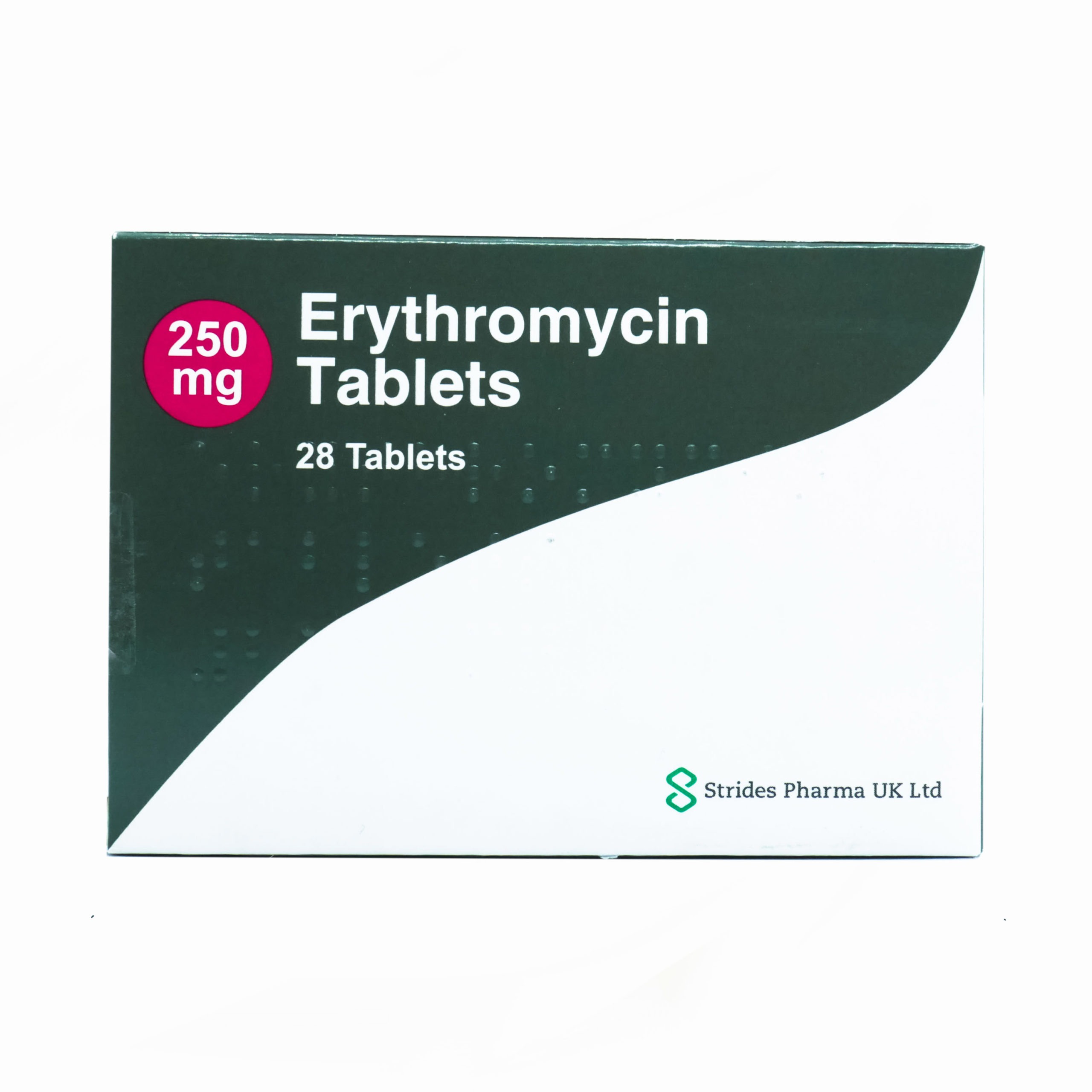Erythromycin 250mg Tablets

Fastest delivery:
Order by 12:00am
-

Free delivery over £50
Fast, tracked delivery from £2.95. Arrives as quickly as the next working day in discreet packaging.
-

100% UK-based pharmacy
Our team of doctors and prescribers, and our support staff, are all UK-based.
-

Free support and advice
We're on hand to offer free support and advice by email and telephone (Mon - Fri 08:30 - 17:00).
-

We’re rated 4.9 out of 5
based on over 17,000 reviews collected on Google and Reviews.io.
Description
What is Erythromycin 250mg Tablets?
Erythromycin is a medication that is used to treat a variety of bacterial infections. Erythromycin can also be used to prevent infections among people who are at high risks, such as people with heart conditions, or those who have undergone surgery. It is also used to break up collections of fluid such as abscesses.
How Does Erythromycin Work?
Erythromycin 250mg Tablets is a macrolide antibiotic. It works by killing bacteria or preventing their growth. This can be achieved by interfering with bacterial protein synthesis, which prevents bacteria from growing and multiplying, thereby clearing the infection. Erythromycin is effective against a wide variety of bacteria, including Streptococcus pneumonia, Streptococcus pyogenes, and Propionibacterium acnes.
It also treats infections of the respiratory tract, including bronchitis, pneumonia, and Legionnaire's disease, infections of the ear, nose, and throat, impetigo and cellulitis, whooping cough, and rheumatic fever.
Warnings
- Inform your doctor of any underlying medical conditions or allergic reactions you experience.
- Inform your doctor of any prescription medication you are using.
- Inform your doctor of your pregnancy or breastfeeding status.
- Avoid driving or operating heavy machinery when using this medication because it can cause dizziness and blurred vision.
- Do not drink alcohol while taking erythromycin 250mg tablets, as it can increase the risk of side effects.
Directions
The recommended dosage for most indications is 250 mg every 6 hours. However, your doctor may prescribe a different dosage depending on your particular circumstances. Follow the instructions of your healthcare provider.
- Erythromycin 250mg Tablets are intended for oral use only.
- Swallow the tablets whole with plenty of water. You can take them with or without food.
- Do not chew or crush the tablet t avoid losing some of its properties.
- Take erythromycin 250mg tablets at evenly spaced intervals. This will help to keep a consistent level of the medication in your body and reduce the chance of missing a dose.
- If you forget to take a dose, take it as soon as you remember unless it is nearly time for your next dose, in which case you can leave out the missed dose. Do not take two doses together to make up for a forgotten dose.
- Store the medication at a normal temperature far from moisture and heat.
Ingredients
The active ingredient in erythromycin 250mg tablets is erythromycin.
The inactive ingredients include lactose, magnesium stearate, maize starch, talc, microcrystalline cellulose, and sodium starch glycolate, among others.
Side Effects
Side effects include:
- Nausea
- Vomiting
- Diarrhoea
- Stomach upset or pain
- Headache
- Tiredness
- Skin rash
- Chest pain, and irregular heartbeat
If side effects become severe, contact your GP.
FAQs
1. How should I take erythromycin?
Take with or without food as prescribed, usually 2-4 times daily. Swallow the tablet whole with water.
2. What if I miss a dose?
Take it as soon as you remember unless it's nearly time for the next dose. Do not double up on doses.
3. Can I drink alcohol while taking erythromycin?
Yes, moderate alcohol consumption does not typically affect erythromycin's effectiveness.
4. Can erythromycin cause side effects?
Possible side effects include stomach pain, nausea, and diarrhea. Severe side effects should be reported to a doctor.
5. Is erythromycin safe during pregnancy?
Consult your doctor before use if you are pregnant or breastfeeding.


